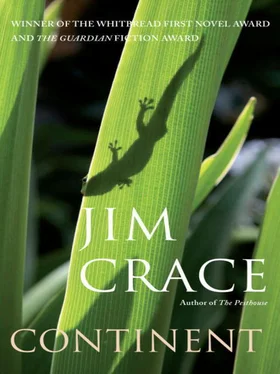BUT THE breeze does not abate. Now it buffets the inner walls and hammers a passage between the guests. The squall is growing from within.
‘My fan!’ says Awni. ‘I had forgotten.’
How could he forget his centrepiece, his gift to the town? It has responded slowly to power — its wooden arms too broad and heavy to rotate freely. It has spun like a seed mast, gradually picking up speed, gradually herding and pocketing the air in the Rest House. Now it is in command.
‘That is a large fan,’ says Nepruolo. ‘It’s as wide as the room…’ All conversation has stopped and Awni’s fan is the centre of attention.
‘Minister,’ demands Awni. ‘Have you ever seen such a fan before, in all your travels, in all the fine buildings you have visited…?’
‘Never,’ says the Minister, thinking of the discreet, silent air-conditioning in his own office, home and car. ‘I believe this fan to be unique.’
‘I dedicate this unique fan to the Minister,’ declaims Awni, ‘in thanks for the provision of electrical power…’
The guests — their faces chilled and rosy from staring windward — feel obliged to applaud both Minister and fan.
Still the giant blades are gaining speed. They shovel air from the heights of the room and pitch it at the heads of honoured guests.
‘See, see!’ cries Awni, blocking all escape through the veranda door. ‘Now everyone is cool. Feel how cool we are!’
The fan’s shadow, cast darkly across the ceiling by electric light, beats and flaps, reaches and dips, like a flail-dancer, spinning faster and giddier. The fan has outstripped electricity: it is self-propelled, driven by its own turbulence. Clothes tug tightly on bodies, eyes are lashed with tears, plates and glasses tumble from shelves and shatter, as squall gusts into gale and gale into cyclone. Who there does not fear the electrical storm?
‘One place is safe,’ says the Minister, putting his arm around the policeman’s wife with the intimacy of an uncle. ‘At the hub.’ They labour against the blast and stand as close as doves in the narrow column of stillness directly beneath the fan.
‘It is simple physics,’ explains the Minister, relishing the plump songstress in his arms. ‘Locate the eye of the storm and escape all turbulence. Here, we are quite safe.’
Their fellow guests recede further from them, flattened and crouching against the Rest House walls. Those who dare watch the ceiling, but they can see no fan. It is moving so fast that it has disappeared. They cup their eyes against the wind and look again. But no, nothing. Only the faint smell of scorched wires, and a cloudy smoking of the air.
The first indication that the storm has peaked is a crack in the ceiling. The second is a shower of crumbled plaster: half settles lightly on the Minister and his ward, half is pulled into the windy vortex and turned into stinging grapeshot. The third is a sharp detonation. The ceiling can no longer withstand the weight and pressure. It releases Warden Awni’s fan. A blade hits the Rest House wall and splinters into a thousand needles of best tarbony. The cyclone is armed.
‘Switch off the current,’ commands an electrician. (He and his comrades are squashed safely behind the restaurant counter.) But too late. The jagged vanguard of needles reaches the guests. Splinters of tarbony slice flesh and chip wall-plaster; missiles of wood lacerate the New York skylines of table lamps and shatter bulbs; a salvo strikes the icebox; a single, knotted bolt of timber finishes the cocktail, showering electricians in mint-water, whisky and liquidizer. What remains of the fan kicks and cracks against the ceiling and then, snapping its wiring, falls. The Minister and the policeman’s wife — those two doves at the eye of the storm — receive the great weight of the wreckage. One by one, the mangoes on the veranda smoke, burn and fail. Now the only light is the occasional flash of a pressman’s camera.
THAT MOONLIT veranda … what travellers gather there, now that the Rest House has closed and we have the Huntsman Hotel with its garden bar, its pool, its patio restaurant, its cane settees and glass-topped tables? Bats, lizards, goats, ghosts. The children dare not venture too close; their parents, nervous of cracking timber and sagging walls, warn against the truculent spirits of electricity. Awni — turned shopkeeper — petitions for compensation, restitution, revenge.
The schoolteacher is more forgiving. He has time on his hands and his own stool at the Huntsman bar.
‘It is a simple matter,’ he says, lifting the patch to display the contour of scars across his eye. ‘The fan was too large and wilful. It ran too fast.’ A saucer turns precariously on the teacher’s finger. ‘That little Rest House could not take the pressure. The fan disintegrated at speed, like a meteorite.’
Visitors from the city see the logic of this — but the townspeople, avoiding those places where electricity is installed, cannot accept so prosaic an explanation.
SEVEN. The Prospect from the Silver Hill
THE COMPANY agent — friendless, single, far from home — passed most days alone in a cabin at Ibela-hoy, the Hill Without a Hat. His work was simple. Equipped with a rudimentary knowledge of mineralogy, neat, laborious handwriting and a skill with ledgers, he had been posted to the high lands to identify the precious metals, the stones, the ores, that (everybody said) were buried there.
This was his life: awake at dawn, awake all day, awake all night. Phrenetic Insomnia was the term. But there were no friends or doctors to make the diagnosis. The agent simply — like a swift, a shark — dared not sleep. He kept moving. He did not close his eyes. At night, at dawn, in the tall heat of the day, he looked out over the land and, watching the shades and colours of the hill and its valley accelerate and reel, he constructed for himself a family and a life less solitary than the one that he was forced to live. He took pills. He drank what little spirit arrived each month with his provisions. He exhausted himself with long, aimless walks amongst the boulders and dry beds. Sometimes he fell forward at work, his nose flattened amongst the gravels on the table, his papers dampened by saliva, his tongue slack. But he did not sleep or close his eyes, though he was still troubled by chimeras, daydreams, which broke his concentration and (because he was conscious) seemed more substantial and coherent than sleeping dreams. As the men had already remarked amongst themselves when they saw the sacs of tiredness spreading across his upper cheeks and listened to his conversation, the company agent either had a fever or the devil had swapped sawdust for his brain.
Several times a week one of the survey gangs arrived in a company mobile to deposit drill cores of augered rock and sand, pumice and shale, and provide the company agent with a profile of the world twenty metres below his feet. He sorted clays as milky as nutsap and eggstones as worn and weathered as a saint’s bead into sample bags. Each rock, each smudge of soil, was condemned. Nothing. Nothing. Nothing. A trace of tin. Nothing.
Once, when he had been at Ibela-hoy for a few weeks only, one of the survey gangs offered to take him down to the lumber station where the woodsmen had established a good still and an understanding with some local women. He sat in the cab of the mobile drilling rig and talked nonstop. That’s the loneliest place, he told them, as the mobile descended from the cabin. There aren’t even ghosts. He spoke, too, about the wife and children, the companionable life, which he had concocted in his daydreams. How he wished he had a camera at home, he told the men. Then he could have shown them photographs of his family, of his garden in the city, his car, his wedding day.
Читать дальше












